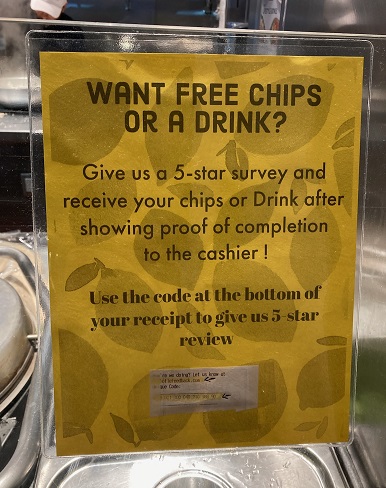Blog
MX Don’t – Gaming the System
While visiting a fast-casual restaurant recently, a MLG team member noticed a sign posted in the area where orders are placed. It offered a free menu item to customers giving the location a 5-star review. It read “Give us a 5-star survey and receive your chips or drink after showing proof of completion to the cashier.” It then directed the customer to where they could find the survey code on their receipt.

Working in the field of CX, this immediately raised some red flags. While asking for and even incentivizing a good review may seem like an easy way to guarantee high scores, it can actually have a negative impact in the long run. Why?
- The ‘feedback’ received isn’t trustworthy or based on real experience. The data provides no real value to legitimate programs designed to improve customer experience and drive change.
- Scores and the true customer experience won’t line up. In the example above, what if the service was poor but the customer wanted a free drink? Scores may appear (falsely) high for a time, but if the experience doesn’t match, a gap will emerge between ratings and customer comments. This can actually degrade the overall customer experience. Leaders may not become aware of service issues in a timely manner, eliminating their ability to take corrective action.
- ‘Paying’ for a good review says that you care more about your rating than actually doing the work and providing a great experience. It could turn what would have been a positive review into a more negative one – not the results you want. It may also deter customers from returning, and in the case of a credit union – establishing a long term relationship
Asking for feedback is a key part of managing customer experience. Honest and transparent feedback has the power to transform processes and make companies better. It should be embraced and acted upon to orchestrate the best possible experience for the customer. By gaming the system, the customer becomes a means to an end, not the priority as they should be.
